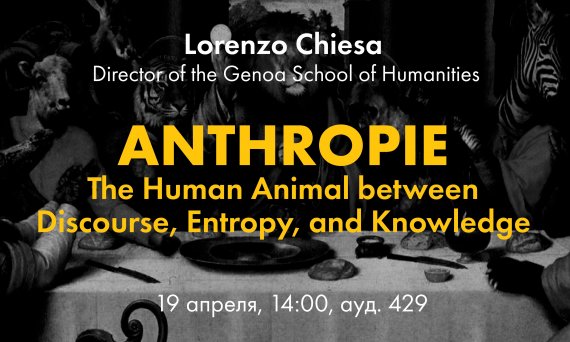In what is arguably his most politically oriented work, Seminar XVII – The Other Side of Psychoanalysis (1969-70), Jacques Lacan coins the neologism anthropie in order to refer to a form of entropy – a degradation or loss of energy – that would be specific to the human animal. In my presentation I will scrutinise this expression. First, I will introduce the notion of discourse, which is the main focus of Seminar XVII. Second, I will show how, in his early Seminars of the 1950s, Lacan already attempted to single out the peculiarity of the speaking animal in relation to other forms-of-life by pointing out that its potentially self-destructive death instinct is somehow anti-entropically contained through the concomitant production of information as an increase of “levels of differentiation”. Third, I will dwell on how Seminar XVII further articulates and rectifies this scenario. At this point, the symbolic order of language, discourse, and knowledge is no longer simply seen as a tentative solution to the “perturbed” biological nature of Homo sapiens but also as an integral part of its predicament. The very slowing down of entropy – the separation of linguistic life from animal undeadness – itself enhances entropy. There is a structural entropic feature of discourse that attempts to totalise knowledge, or differentiation, which increasingly indifferentiates it in a chaotic manner. On the one hand, this endeavour – epitomised by the capitalist-bureaucratic capture of knowledge and its contradictory brandishing of the “happy life” as an elimination of loss – is itself inconclusive. On the other hand, the enhancement of entropy through knowledge may turn out to be truly irreversible and can already be given very concrete or at least evocative names, such a nuclear holocaust, environmental point of no return, pandemic malware, super-intelligent AI takeover, and so on.
Bio-bibliographical Note:
Lorenzo Chiesa is a philosopher who has published extensively on psychoanalysis, biopolitics, and Marxism. His works include Subjectivity and Otherness: A Philosophical Reading of Lacan (MIT Press, 2007); The Italian Difference (Re.press, 2009) (with Alberto Toscano); Italian Thought Today (Routledge, 2014); Lacan and Philosophy: The New Generation (Re.press, 2014); The Not-Two: Logic and God in Lacan (MIT Press, 2016); and The Virtual Point of Freedom (Northwestern University Press, 2016). He is Director of the Genoa School of Humanities, Visiting Professor at the European University at Saint Petersburg, and teaches at the Freud Museum, London. He is the editor of the forthcoming book series Insubordinations at the MIT Press. Previously, he was Professor of Modern European Thought at the University of Kent, where he founded and directed the Centre for Critical Thought.
